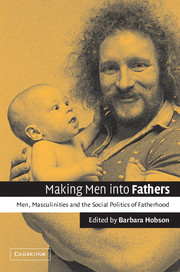Book contents
- Frontmatter
- Contents
- List of figures
- List of tables
- Preface
- Introduction: making men into fathers
- Part 1 Who fathers?
- Part 2 Men in social policy and the logics of cash and care
- 2 Citizens, workers or fathers? Men in the history of US social policy
- 3 Compulsory fatherhood: the coding of fatherhood in the Swedish welfare state
- 4 The problem of fathers: policy and behavior in Britain
- 5 A new role for fathers? The German case
- 6 Transformations of fatherhood: the Netherlands
- Part 3 Resisting and reclaiming fatherhood
- Part 4 Theorizing men, masculinities and fatherhood
- Notes
- References
- Index
4 - The problem of fathers: policy and behavior in Britain
Published online by Cambridge University Press: 22 September 2009
- Frontmatter
- Contents
- List of figures
- List of tables
- Preface
- Introduction: making men into fathers
- Part 1 Who fathers?
- Part 2 Men in social policy and the logics of cash and care
- 2 Citizens, workers or fathers? Men in the history of US social policy
- 3 Compulsory fatherhood: the coding of fatherhood in the Swedish welfare state
- 4 The problem of fathers: policy and behavior in Britain
- 5 A new role for fathers? The German case
- 6 Transformations of fatherhood: the Netherlands
- Part 3 Resisting and reclaiming fatherhood
- Part 4 Theorizing men, masculinities and fatherhood
- Notes
- References
- Index
Summary
Fathers entered the policy agenda in Britain, as elsewhere, at the end of the 1980s. Superficially, the debates in many Northern European countries and in the United States look somewhat similar, revolving mainly around the responsibilities of fathers to maintain and to care for their children. However, there have been real differences in what has driven the policy debate in the different countries and in the nature of the policy response.
In respect of the policy debate, the balance between concern about fathers' roles as providers and as carers has been different in the different countries. In Scandinavia, where the dual-earner model is firmly established and where adult citizenship is tied to participation in the labor market, the focus has been more upon the care provided by fathers, and has been part of the debate about achieving greater equality in the division of unpaid as well as of paid work. In Britain, which has historically adhered to a strong male breadwinner model in terms of its social policies, more emphasis has been put on the obligation of fathers to maintain. Care has been secondary in the debate, although there has been considerable concern about the effects of father-absence on children (whether as a result of divorce or unmarried motherhood), which has filtered through from the American as well as the British psychology literature.
- Type
- Chapter
- Information
- Making Men into FathersMen, Masculinities and the Social Politics of Fatherhood, pp. 125 - 149Publisher: Cambridge University PressPrint publication year: 2002
- 24
- Cited by



